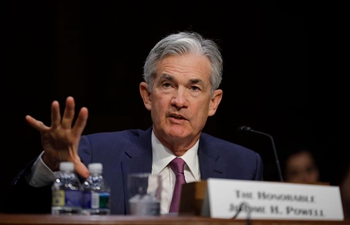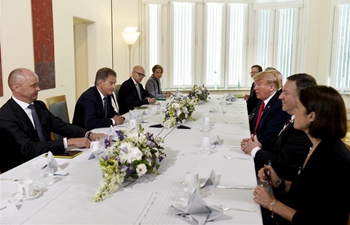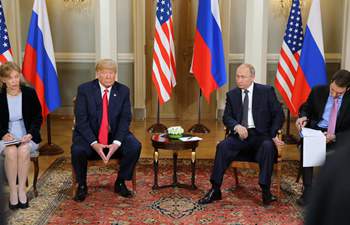WASHINGTON, July 19 (Xinhua) -- Representatives from auto manufacturers, dealers, industry groups, and foreign countries on Thursday widely criticized the U.S. investigation into automotive imports, warning it would harm American consumers, undermine the U.S. auto industry and cause thousands of job losses.
"I'm here today to reiterate our strong opposition to this unprecedented, unwarranted investigation and the potential imposition of higher tariffs on imported autos and auto parts," said Jennifer Thomas, vice president of Federal Government Affairs at the Alliance of Automobile Manufacturers, during a public hearing at the U.S. Commerce Department.
"Our view is shared by over 2,200 comments filed before this hearing. In fact, we only found 3 organizations supporting this inquiry," Thomas told officials at the Commerce Department who are examining potential tariffs on automobiles and auto parts.
"The opposition to this investigation is widespread and deep because the damaging consequences are alarming. Higher auto tariffs will harm American families and workers, along with the economy," she argued.
The Commerce Department in May initiated the so-called Section 232 investigation into the national security implications of automobile imports, claiming that imports from abroad had eroded the U.S. auto industry.
But Matt Blunt, president of the American Automotive Policy Council (AAPC), said there is "no evidence" that automotive imports pose a threat to U.S. national security, as there is "sufficient capacity" to meet any national security requirements.
Blunt, who represents the common public policy interests of America's automakers, warned that new tariffs on autos imports will lead to higher manufacturing costs, lower demand and lower U.S. auto sales and production.
"AAPC's analysis showed that a tariff increase under Section 232,coupled with existing tariffs on imported steel and aluminum, including from our North American allies, will result in a net loss of American jobs, lower capital investment and lower exports by the U.S. auto sector," he said.
"A 25 percent tariff applied to all imports would hurt auto manufacturers, dealers, consumers and the economy as a whole. And the hardest hit would be our customers," echoed Peter Welch, president of the National Automobile Dealers Association (NADA).
American consumers would see a rise of 4,400 U.S. dollars in the price of the typical vehicle sold in the United States if a 25 percent tariff was imposed on all imported autos and auto parts, according to a study released by the Center for Automotive Research (CAR).
The hearing came after more than 140 lawmakers in the U.S. House of Representatives on Wednesday urged the Trump administration to drop its investigation into automotive imports.
"We do not believe that imports of automobile and automotive parts pose a national security threat. Rather, we believe the imposition of trade restrictions on these products could undermine our economic security," these lawmakers wrote in a letter to U.S. Commerce Secretary Wilbur Ross.
Ross said Thursday at the start of the hearing that the Trump administration had not made a decision on whether to impose tariffs on automotive imports.
"It is too early now to say if this investigation will ultimately result in Section 232 recommendations on national security grounds. The department did recommend action in our investigations of steel and aluminum imports, but each industry is different," he said.
The Trump administration has used the Section 232 to unilaterally impose high tariffs on steel and aluminum imports on the grounds of national security, provoking strong opposition from the domestic business community and retaliatory measures from U.S. trading partners.
Representatives from the European Union (EU), Canada and other countries on Thursday warned that they could retaliate against hundreds of billions of dollars of American exports if the United States imposes tariffs on imported automobiles and auto parts.
"Import restrictions resulting from the present investigation could result in countermeasures on a significantly higher volume of U.S. exports, which we estimate at 294 billion dollars," said David O'Sullivan, the EU ambassador to the United States.
"For its part, the EU is proceeding with internal preparations in the event the U.S. were to adopt trade restrictive measures," he said.
Kirsten Hillman, Canada's deputy ambassador to the United States, also said Canada will once again be forced to respond in a proportional manner "should this investigation ultimately result in the application of tariffs on autos."
An analysis conducted by the Peterson Institute for International Economics (PIIE), a Washington-D.C. based think tank, showed that 624,000 U.S. jobs would be lost and 5 percent of the workforce in the auto and parts industries would be displaced if other countries retaliate with tariffs on similar U.S. products.















